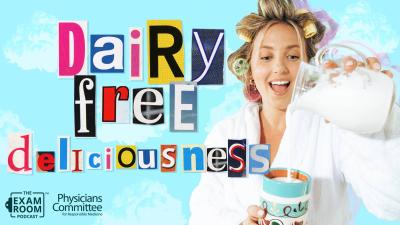Doctors Group Denounces ‘Whole Milk for Healthy Kids Act,’ As Senate Holds Hearing on the Dangerous Legislation

Washington, D.C.—As the Senate Committee on Agriculture, Nutrition, and Forestry meets this morning for a hearing on the "Whole Milk for Healthy Kids Act," the nonprofit Physicians Committee for Responsible Medicine, which has 17,000 doctor members, is denouncing the legislation that prioritizes dairy industry profits over the health of our nation’s children.
“Instead of addressing real changes to provide healthier school meals, Congress is intent on passing the so-called 'Whole Milk for Healthy Kids Act.’ This bill might improve the dairy industry’s sales, but it’s doing so at the expense of children’s health,” says Physicians Committee President Neal Barnard, MD. “Congress should be putting less saturated fat on school lunch trays, not more, and it can do that by making it easier for students to access nondairy beverages and plant-based entrees.”
Research shows that early signs of heart disease, high cholesterol, and other indicators of cardiovascular disease are appearing in children with increasing frequency. Forcing full-fat whole dairy milk back into schools—which the “Whole Milk for Healthy Kids Act” seeks to do—will only cause further health problems for our nation’s youth.
This legislation fails to remove barriers that schools and parents face in providing and accessing nondairy substitutes. Currently, nondairy milks are required to be served only if a parent submits a note from a physician documenting a “disability” that restricts their child’s diet. The cost of a physician visit (and the lost time from work for a parent) is an unnecessary burden that prevents students from receiving appropriate nutrition at school. Notably, due to high incidences of lactose intolerance, parents and students of color suffer disproportionately from this burden.
Whole milk provides no nutrients that cannot be found in other sources. Protein, for example, can easily be sourced from other foods and drinks (like soy milk) that do not contain saturated fat. Rich sources of calcium include kale, broccoli, tofu, nuts, beans, and fortified orange juice. Potassium is similarly available in a wide range of plant foods. Sun exposure is the best means of getting adequate vitamin D.
To learn more about the dangers of dairy products and the "Whole Milk for Healthy Kids Act," visit PCRM.org/HealthyStudents.
Media Contact
Michael Keevican
202-527-7367
mkeevican[at]pcrm.org
Founded in 1985, the Physicians Committee for Responsible Medicine is a nonprofit organization that promotes preventive medicine, conducts clinical research, and encourages higher standards for ethics and effectiveness in education and research.








